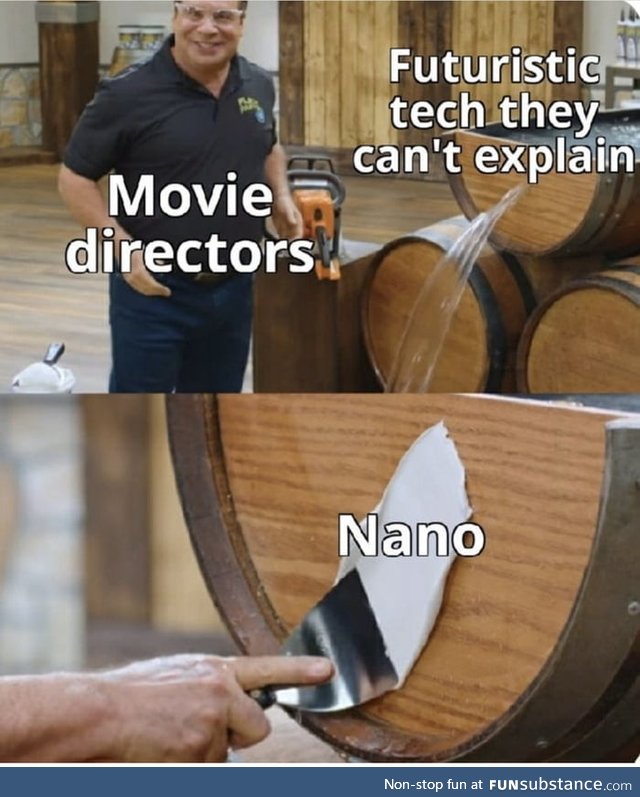Comments
Follow Comments Sorted by time
karlboll
· 4 years ago
· FIRST
I'm a big fan of this trope. These days it's all nano and quantum, because that's the "direction" our technology and scientific theory is looking. But to back through the ages and you have Mary Shelley's Frankenstein's lightning inspired by Galvani. My personal favourites are around the late forties when sci-fi authors solve all problems with radiation, beams and special vacuum tubes. In hindsight it's both hilarious and thought-provoking as it questions how silly our current understanding of reality will seem in fifty years.
13
creativedragonbaby
· 4 years ago
I’m now excited to see what comes next
2
guest_
· 4 years ago
Me too. Looking at what people in the past thought the future would be- and being able to see what it really turned out to be is a lot of fun. Sometimes they actually aren’t TOO far off, at least in some broad strokes concepts. And as you say- we can’t really understand things we don’t know about. Even watching 80’s and 90’s science fiction about AI or computers and what they thought they could do etc....
2
Show All
guest_
· 4 years ago
... but one can also challenge themselves to take t from a different perspective. When a robot is able to control a car or some heavy machine like a giant RC with its thoughts for example- even as early as 15 or so years ago that was laughable. Nothing about a car or a robot would really make this possible. They might, depending on the time, say “radio waves” “microwaves” “sonic waves” “nano machines...” but... in 2020 and likely in the future- developments like electronic steering and throttle/braking by wire and computer controlled transmissions, integrated WiFi etc in cars- would make that plausible. So they missed the mark on HOW- but the IDEA is sound.
2
guest_
· 4 years ago
Most science fiction made for entertainment is not very futurist. With good reason. Most people wouldn’t like it. Read a book from 200 years ago, read letters people wrote to each other. Language would likely change profoundly. Even compared to 50 years ago- especially slang. But- you’ve got a couple plates to balance at once.
1
guest_
· 4 years ago
If you set a work even in 2070- but especially let’s say 2100+... if people have to strain to understand characters dialog, they’ll be put off. Sci fi is full of cringe worthy slang- and most works might proper some “tech slang” they usually catch us up on or make obvious (blade runner and “skin jobs” for replicants etc) or some light misc slang that isn’t too far out like BSG and “Frak.” Even Firefly was fairly conservative in this regard and used a lot of recycled or antique words and it was STILL a major factor in off putting broad audiences.
1
guest_
· 4 years ago
So asides being able to comprehend what is being said and not making people cringe (a lot of people cringed or still cringed at things like “Gucci”, “Vibe”, “Vaccay” etc etc. some slang becomes cringable almost instantly- the “izzle” period was rather brief and what makes slang “cool” and accepted vs maligned is highly contextual and partially based on exposure and seeing those we think of as aspirational using it.)
2
guest_
· 4 years ago
Beyond slang- in space, in science, when dealing with technical things- most people use “technological terms” and acronyms and short hand. “WiFi” “USB” “USB-C” “lightening” “SD card” “SIM card” “VPN” “VOIP” are all common ones.
1
guest_
· 4 years ago
But... in the future- they’d likely have their own terms. We take for granted familiarity with our world- but if you speak multiple languages you can probably understand that even being proficient in a conversation- even common technical terms can be difficult or impossible to get or figure out in another language that doesn’t use the same or similar as yours. In Japanese the Exhaust manifold for a car is often called an “Octopus Foot.” The English word Drill- penetrate? Practice? If someone told you to drill a hole in the exhaust manifold that’s already Greek to some English speakers- but what would you think reading “practice the octopus foot?” (Not a REAL translation- just an example using some real world language.)
1
guest_
· 4 years ago
So language is a big part- not just changes in common tongue- but evolving terms. Bluetooth- common term for wireless connection. CarPlay, etc- but if you showed this technology 30 years before smart phones and Bluetooth- what would you call it? If the words existed but your audience would t understand “4G cell” you’d probably just say “high speed radio phone..” and TECHNICALLY it’s not wrong- sort of.
1
guest_
· 4 years ago
But the truth is that society and technology change so much that many of us would be lost and uncomfortable with very “hard futurist” sci fi. Go back through star trek- a “progressive” franchise. A single inter racial kiss or exposed belly button was a big deal. All indications would predict that as a very likely daily scenario in a future. The times weren’t ready. The idea of women in command didn’t really start to become viable in the franchise until the 80’s- and look how they still treated women- by modern standards their “enlightened” ways could get them a trending feminist scandal hashtag. Homosexuality was played at it a few of the newer series- and we can see it go from less implied and more implicit over time- but where are all the gays and bi’s in the future?
1
guest_
· 4 years ago
Often- the reactions of characters to things like non binary gender (even in aliens..) or sexualities other than Herero binary- mirror those of what a moderate progressive of the times might have. But not so long ago- just thinking of people of color as equal and testing them such was pretty radically liberal- with “live and let love but maybe not in my neighborhood” being the moderate progressive approach.
1
guest_
· 4 years ago
Sci-fi is of course most often a lens for looking at the present and not actually about the future- but it has to be made for audiences of a time because well... explain the geopolitical and social setting, technology and challenges etc. of 2020 to someone from 1800 and see how that goes. I mean- “WW1 was started by a sandwich..” we have enough trouble understanding how the events of that period led to world war. To many- the Cold War is baffling. It just looks like stubborn stupidity and yet... we aren’t so much better.
2
guest_
· 4 years ago
From the Salem witch trials on- we say “man those people were dumb...” yet Chinese restaurants have seen a massive drop in customers and Many “Asians” are seeing discrimination and suspicion because of Corona virus. We shame the 40’s for interning Japanese Americans- we locked up a bunch of South American kids in cages- not out of fear they were actively enemies of our country- but out of fear they’d impact our bottom dollar. And the treatment of “middle eastern” “Muslim” “Arab” etc. after 9/11 hasn’t exactly made us seem so much better than those “fools” in the past.
1
guest_
· 4 years ago
So it’s interesting to see what we think will change in the future, what we hope will change, and how in reality and sci fi- society may change and progress- but technology always outpaces it. It’s interesting to see- even when they get the “how” wrong on a technology- that we actually have a technology they imagined, or some version...
1
guest_
· 4 years ago
And how they THOUGHT it would be used and in what aspects of life versus how we actually use it. That’s a major sci fi common hole. You invent a world with some technology that could and likely would change everything- but people still use it the way we would, society still isn’t too far from what we would recognize. It still has to be interesting of course. Space fighter craft are cool- don’t make much sense usually. And why pilots? Why not drones? Mech suits... why not robots? People can communicate FTL reliably and we can’t do reliable WiFi? It’s still fun and interesting- but it’s also interesting to see the places the builder of a universe just slapped some futuristic things into a near copy of the present.
1
deleted
· 4 years ago
Or quantum
3












